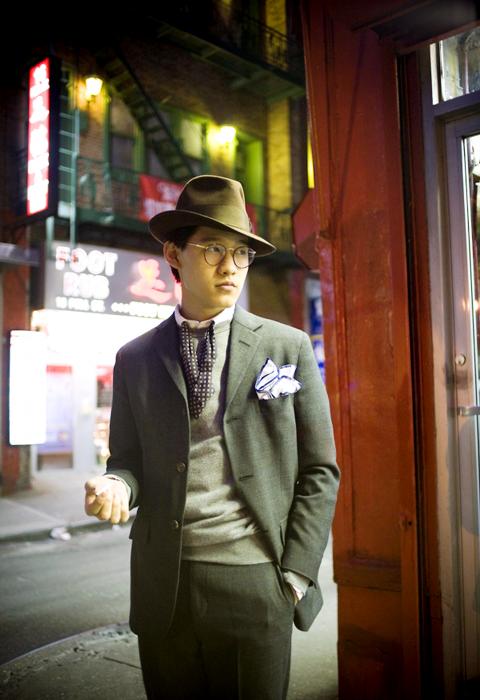Raymond Chu (朱永睿) sits at an outdoor table of an Italian restaurant in Taipei’s business district of Neihu (內湖) smoking a cigarette. Dressed in Ralph Lauren plaid tweed, it feels as if the young filmmaker has brought a whiff of debonair Brooklyn back with him to Taipei.
The native New Yorker and co-founder of Lofty Entertainment, who spent his high school years in Taiwan, was taking a break from writing the script of his first feature film The Bloody Angle, which he will discuss tomorrow at the historic Yang San-lang Art Museum (楊三郎美術館) in New Taipei City for the monthly Filmmakers Night organized by South African filmmaker Tobie Openshaw.
While directing his short film American Odyssey, which premiered at the Soho International Film Festival in May, Chu was compiling research on Chinese-American gangsters in Manhattan’s Chinatown. The Bloody Angle, he said, will tell the story of Sai Wing Mock, also known as Mock Duck, whose criminal organization the Hip Sing Tong wreaked havoc on Doyers Street and clashed with their rivals from the On Leong Tong, another gang.

Photo courtesy of Rose Callahan
Chu says there was a time in Hollywood when Italian Americans were depicted as petty thieves, but Francis Ford Coppola’s The Godfather “elevated the image of the Italian gangster family into a Shakespearean epic.”
Chu hopes to do the same for Chinese Americans with his own film. As with any film director, part of the drive is personal.
“Growing up as an Asian American, people’s perceptions of us were that we were coolies and worked in factories,” Chu says. “So I started to wear suits because people needed to know that Asian Americans can dress well too.”
People with Asian ancestry are still very much portrayed in American pop culture as conforming to certain molds, from the model minority to the kungfu villain — and filmmakers like Chu believe in producing more films in which Asian Americans really stand their own ground.
It hasn’t been an easy feat though, given the dearth of information published about Mock Duck. However, one of the most exciting parts of the research process for Chu was talking to Mock’s great-granddaughter Laura Isler.
“Ninety percent of what she told me was different than what I read in the books,” Chu says. “Then somewhere down the line, we discovered that Mock Duck had started a second family after his first family was killed in 1916 and that she was part of the second family.”
After this revelation, Chu felt that delving further into the gangster’s life was probably a good approach.
“The more specific you get, the more universal your story becomes,” he said, referring to the similar experiences shared by Italian and Chinese immigrants living in New York.
People who show up to Filmmakers Night can also expect some fashion lessons. Chu, who has been wearing fedoras and vintage tweed since his high school days, used to work for Ralph Lauren.
“I don’t design clothes, I design dreams,” Chu says, quoting the legendary designer.
Likewise, Chu adds, filmmaking is not only about selling a film, but it’s essentially selling a dream to your audience.
“It’s an attention-currency economy,” he said. “Your value is based on how much attention you get.”

This year will go down in the history books. Taiwan faces enormous turmoil and uncertainty in the coming months. Which political parties are in a good position to handle big changes? All of the main parties are beset with challenges. Taking stock, this column examined the Taiwan People’s Party (TPP) (“Huang Kuo-chang’s choking the life out of the TPP,” May 28, page 12), the Democratic Progressive Party (DPP) (“Challenges amid choppy waters for the DPP,” June 14, page 12) and the Chinese Nationalist Party (KMT) (“KMT struggles to seize opportunities as ‘interesting times’ loom,” June 20, page 11). Times like these can

June 23 to June 29 After capturing the walled city of Hsinchu on June 22, 1895, the Japanese hoped to quickly push south and seize control of Taiwan’s entire west coast — but their advance was stalled for more than a month. Not only did local Hakka fighters continue to cause them headaches, resistance forces even attempted to retake the city three times. “We had planned to occupy Anping (Tainan) and Takao (Kaohsiung) as soon as possible, but ever since we took Hsinchu, nearby bandits proclaiming to be ‘righteous people’ (義民) have been destroying train tracks and electrical cables, and gathering in villages

Dr. Y. Tony Yang, Associate Dean of Health Policy and Population Science at George Washington University, argued last week in a piece for the Taipei Times about former president Ma Ying-jeou (馬英九) leading a student delegation to the People’s Republic of China (PRC) that, “The real question is not whether Ma’s visit helps or hurts Taiwan — it is why Taiwan lacks a sophisticated, multi-track approach to one of the most complex geopolitical relationships in the world” (“Ma’s Visit, DPP’s Blind Spot,” June 18, page 8). Yang contends that the Democratic Progressive Party (DPP) has a blind spot: “By treating any

Swooping low over the banks of a Nile River tributary, an aid flight run by retired American military officers released a stream of food-stuffed sacks over a town emptied by fighting in South Sudan, a country wracked by conflict. Last week’s air drop was the latest in a controversial development — private contracting firms led by former US intelligence officers and military veterans delivering aid to some of the world’s deadliest conflict zones, in operations organized with governments that are combatants in the conflicts. The moves are roiling the global aid community, which warns of a more militarized, politicized and profit-seeking trend